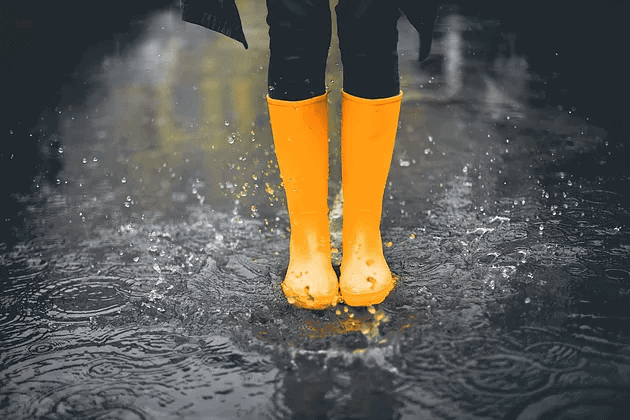“It’s raining, it’s pouring . . .”. Most parents and nannies tend to stay indoors when it is raining outside but playing in the rain can beneficial for children. Almost every child will stomp in a puddle as children tend to like the rain. As caregivers, we often worry about children getting wet and sick from being outside in the rain.
A healthy child’s immune system will protect them from colds, and the health benefits from the exercise usually outweigh the risks of getting ill. Of course, as with any endeavor involving children, care must be taken. Appropriate clothing is required and that includes waterproof coats and hats as well as sturdy, well-fitting boots. If it’s summer and the temperature is warm enough – a swimsuit may be the only clothing needed. The goal should be to keep the child warm.
Outdoor play in all types of weather has been proven to be impact children in a multitude of ways.
- Playing outdoors encourages children to be physically active which makes them less likely to become overweight and suffer from the health issues associated with obesity such as diabetes and heart disease.
- Outdoor play often involves the use of gross motor skills such as running, jumping, and climbing. This results in better agility, balance and coordination. They are also generally sick less often.
- Playing outside increases a child’s level of Vitamin D, even on cloudy days. This vitamin has traditionally been linked with the development of strong bones and recent research indicates that it may also be an important factor in maintaining a healthy immune system.
- Children who play outdoors are more likely to use their imaginations in their play and often play with others, increasing their skills at interacting with other children.
- Playing outdoors and being in nature helps children be more aware of their surroundings and may increase reasoning and observation skills which can help the child in all other areas of development.
So how do you encourage children to play in the rain?
First, you need to make sure they understand the conditions must be conducive to play. Children should not be outdoors in stormy weather with thunder, lightning, and high winds. Driving rains are also not conducive to play. Children must understand that there is a time limit on the play. Especially in cooler weather, care must be taken that the children don’t get too cold and wet. Set a timer and keep towels by the door to quickly dry off when play is over. A warm bath may also be a good ending to an outdoor play session – especially if the weather is cooler or if the child finds a lot of mud!
Discuss safety with the children before they go outside. Talk to them about being aware of weather changes such as increases in the rain, hearing thunder, or seeing lightning. Of course, you will be outside with them, but they need to learn to be aware of their environment and let you know if they notice changes. You must be aware of the surrounding area; if there are sewers, drainage ditches, or streams nearby, children should be warned of their hazards and kept away from them. A child can be swept away very quickly in fast-moving waters.
Once they are appropriately dressed and ready to go, what can they do? Children will most often start out by running around and jumping in puddles. Some may sing and dance or catch water drops on their tongues. Others may want more structured play. A water balloon contest or a painting contest using chalk or even mud may be the challenge they want. Dry weather games are also appropriate – tag, hopscotch, red rover, and even football and soccer work in any weather. Bath or beach toys can be taken out in the rain and played within puddles or even mud. Some children may want to take pictures and a waterproof camera can give them the artistic outlet they desire.
When playtime is over, get the children dried off and into dry clothes.
Even in summer, it is not recommended that children stay in wet clothing for long periods of time. Take the time to talk to the children about their outdoor play and discover what they liked and what they didn’t like. Brainstorm ideas for the next rainy-day play session. Then you will be ready to take advantage and expand a child’s horizons the next time Mother Nature gives you rainy days.
Nannies who want to learn more about child development and childcare can enroll in online nanny classes and earn childcare certifications at the USNannyInstitute.com.


As a retired Early Childhood teacher/director I vouch for outside play!!! The children need to be dressed properly and put into dry clothing
when they are done. Lots of learning goes on under different circumstances and the children love to be able to overcome the differences!